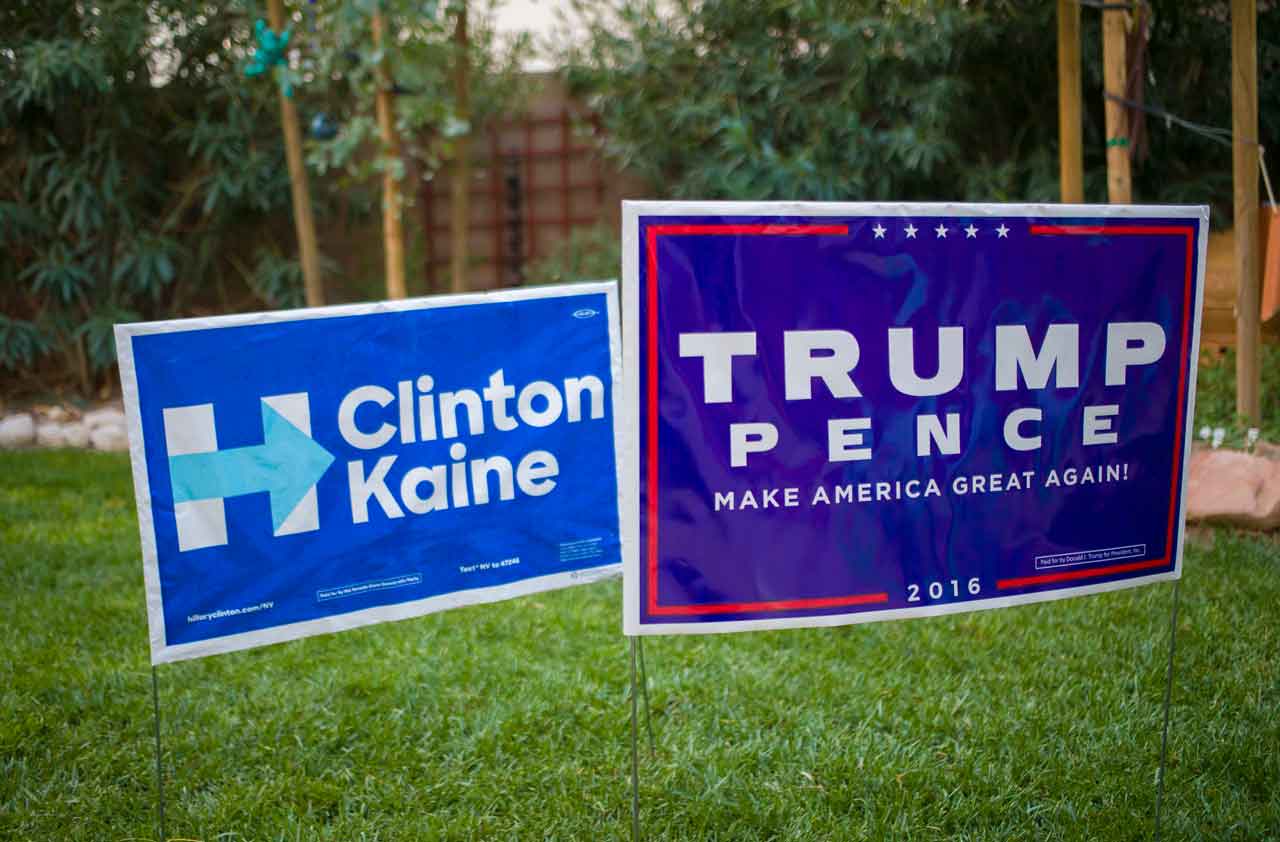What Investors Should Learn from the Presidential Election
How markets reacted to Donald Trump’s presidential win proves that you should focus on investing for the long haul.


Profit and prosper with the best of Kiplinger's advice on investing, taxes, retirement, personal finance and much more. Delivered daily. Enter your email in the box and click Sign Me Up.
You are now subscribed
Your newsletter sign-up was successful
Want to add more newsletters?

Delivered daily
Kiplinger Today
Profit and prosper with the best of Kiplinger's advice on investing, taxes, retirement, personal finance and much more delivered daily. Smart money moves start here.

Sent five days a week
Kiplinger A Step Ahead
Get practical help to make better financial decisions in your everyday life, from spending to savings on top deals.

Delivered daily
Kiplinger Closing Bell
Get today's biggest financial and investing headlines delivered to your inbox every day the U.S. stock market is open.

Sent twice a week
Kiplinger Adviser Intel
Financial pros across the country share best practices and fresh tactics to preserve and grow your wealth.

Delivered weekly
Kiplinger Tax Tips
Trim your federal and state tax bills with practical tax-planning and tax-cutting strategies.

Sent twice a week
Kiplinger Retirement Tips
Your twice-a-week guide to planning and enjoying a financially secure and richly rewarding retirement

Sent bimonthly.
Kiplinger Adviser Angle
Insights for advisers, wealth managers and other financial professionals.

Sent twice a week
Kiplinger Investing Weekly
Your twice-a-week roundup of promising stocks, funds, companies and industries you should consider, ones you should avoid, and why.

Sent weekly for six weeks
Kiplinger Invest for Retirement
Your step-by-step six-part series on how to invest for retirement, from devising a successful strategy to exactly which investments to choose.
The bumper stickers are still on cars, and campaign signs still decorate some of our neighbors’ yards, but it’s already clear that the 2016 presidential election will be discussed and studied for years to come. No matter how you feel about Donald Trump’s win over Hillary Clinton, investors can learn a great deal from the election, especially about how the markets reacted.
Simply put, the election is a great example of how emotions control the markets in the short term.
In the final days of the campaign, you could see the markets pricing in a Clinton presidency. The markets always like certainty and, whether you agree with Clinton’s policies or not, people know who she is and how she would govern. For the last quarter of a century, Clinton has been a familiar figure, and the markets reacted accordingly. The last two days before the election we saw growth in the markets as Clinton was expected to win.
From just $107.88 $24.99 for Kiplinger Personal Finance
Become a smarter, better informed investor. Subscribe from just $107.88 $24.99, plus get up to 4 Special Issues

Sign up for Kiplinger’s Free Newsletters
Profit and prosper with the best of expert advice on investing, taxes, retirement, personal finance and more - straight to your e-mail.
Profit and prosper with the best of expert advice - straight to your e-mail.
As results came in on Election Day, you could see the markets react to the increasing possibility of a Trump presidency. After-hours trading started to drop. As it became more evident that Donald Trump was going to win, futures started taking a nose dive. When Trump was announced as the winner and he spoke, the markets started to rebound. The next day, once Wall Street had processed the results and the pundits began to dig into Trump’s actual policies and proposals, the markets garnered some momentum, finishing the day up around 250 points.
The election serves as a classic example of how emotions — euphoria, fear, greed — have the tendency to drive short-term markets. That’s when investors should be careful, as we can trip up over own biases and emotions. We should think about riding out that emotional volatility, which is increasingly hard to do in this age of social media and instant communications. With so many stories out there that can impact our investment strategies, we have to do our diligence on authors and their articles. We have to vet the information we come across and the biases it might contain.
All of us have to remember that investing is usually a long-term proposition and fundamentals will eventually take over. That’s one of the reasons having an experienced, knowledgeable adviser can help. Of course, investors need to trust the advisers they work with to build a proper allocation or offer recommendations. Just like filtering out news stories, investors need to do their research when it comes to advisers and money managers.
When looking for an adviser, investors should consider finding an adviser that can review how volatility can impact their retirement and put together a plan considering asset allocation based on their needs and their situation. The best financial plans are typically built for the long haul. Sure, there might be short-term volatility, but the shrewdest investors known to turn off the noise and keep focused on their long-term plans.
Investing can involve riding an emotional roller coaster. It comes with the territory. But a good adviser can help make sure investors are strapped in tightly with a secure seat belt and a strong harness over their shoulders. Over the long term, with the right adviser and plan in place, investors will be able to survive the ups and downs of the market and emerge stronger than when they started in the markets.
Markets will always cycle, of course, but, in the long haul, investors will typically be fine if they remain aware that fundamentals drive the market – even as we all experience emotional highs and lows with each election and news cycle.
Curt D. Knotick is a financial adviser and chief executive officer at Accurate Solutions Group, LLC, based out of Butler, Pa. He has more than 26 years’ experience in the financial industry. ).
Investment Advisory Services offered through Global Financial Private Capital, an SEC Registered Investment Adviser. ).
Kevin Derby contributed to this article. ).
Profit and prosper with the best of Kiplinger's advice on investing, taxes, retirement, personal finance and much more. Delivered daily. Enter your email in the box and click Sign Me Up.

Curt D. Knotick is a financial adviser, insurance professional and managing partner at Accurate Solutions Group. He hosts the radio program "Your Retirement Blueprint" with Curt Knotick.
-
 Nasdaq Leads a Rocky Risk-On Rally: Stock Market Today
Nasdaq Leads a Rocky Risk-On Rally: Stock Market TodayAnother worrying bout of late-session weakness couldn't take down the main equity indexes on Wednesday.
-
 Quiz: Do You Know How to Avoid the "Medigap Trap?"
Quiz: Do You Know How to Avoid the "Medigap Trap?"Quiz Test your basic knowledge of the "Medigap Trap" in our quick quiz.
-
 5 Top Tax-Efficient Mutual Funds for Smarter Investing
5 Top Tax-Efficient Mutual Funds for Smarter InvestingMutual funds are many things, but "tax-friendly" usually isn't one of them. These are the exceptions.
-
 Social Security Break-Even Math Is Helpful, But Don't Let It Dictate When You'll File
Social Security Break-Even Math Is Helpful, But Don't Let It Dictate When You'll FileYour Social Security break-even age tells you how long you'd need to live for delaying to pay off, but shouldn't be the sole basis for deciding when to claim.
-
 I'm an Opportunity Zone Pro: This Is How to Deliver Roth-Like Tax-Free Growth (Without Contribution Limits)
I'm an Opportunity Zone Pro: This Is How to Deliver Roth-Like Tax-Free Growth (Without Contribution Limits)Investors who combine Roth IRAs, the gold standard of tax-free savings, with qualified opportunity funds could enjoy decades of tax-free growth.
-
 One of the Most Powerful Wealth-Building Moves a Woman Can Make: A Midcareer Pivot
One of the Most Powerful Wealth-Building Moves a Woman Can Make: A Midcareer PivotIf it feels like you can't sustain what you're doing for the next 20 years, it's time for an honest look at what's draining you and what energizes you.
-
 I'm a Wealth Adviser Obsessed With Mahjong: Here Are 8 Ways It Can Teach Us How to Manage Our Money
I'm a Wealth Adviser Obsessed With Mahjong: Here Are 8 Ways It Can Teach Us How to Manage Our MoneyThis increasingly popular Chinese game can teach us not only how to help manage our money but also how important it is to connect with other people.
-
 Looking for a Financial Book That Won't Put Your Young Adult to Sleep? This One Makes 'Cents'
Looking for a Financial Book That Won't Put Your Young Adult to Sleep? This One Makes 'Cents'"Wealth Your Way" by Cosmo DeStefano offers a highly accessible guide for young adults and their parents on building wealth through simple, consistent habits.
-
 Global Uncertainty Has Investors Running Scared: This Is How Advisers Can Reassure Them
Global Uncertainty Has Investors Running Scared: This Is How Advisers Can Reassure ThemHow can advisers reassure clients nervous about their plans in an increasingly complex and rapidly changing world? This conversational framework provides the key.
-
 I'm a Real Estate Investing Pro: This Is How to Use 1031 Exchanges to Scale Up Your Real Estate Empire
I'm a Real Estate Investing Pro: This Is How to Use 1031 Exchanges to Scale Up Your Real Estate EmpireSmall rental properties can be excellent investments, but you can use 1031 exchanges to transition to commercial real estate for bigger wealth-building.
-
 The 8 Stages of Retirement: An Expert Guide to Confidence, Flexibility and Fulfillment, From a Financial Planner
The 8 Stages of Retirement: An Expert Guide to Confidence, Flexibility and Fulfillment, From a Financial PlannerRetirement planning is less about hitting a "magic number" and more about an intentional journey — from understanding your relationship with money to preparing for your final legacy.